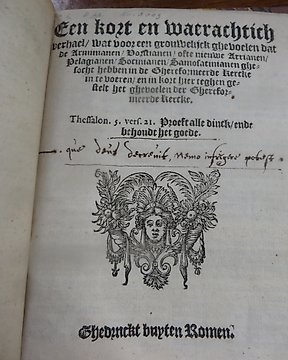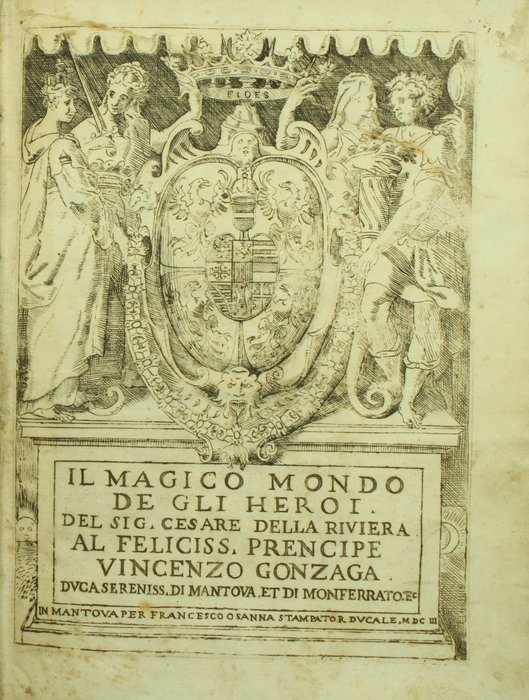
N.N. / Martinus Luther / Jacobus Arminius / Franciscus Gomarus - 'Tsamen sprekinghe'' [en] 'Een kort en waerachtig verhael' (...) - 1611/1612
Nr. 16270027

Nr. 16270027

THE EXCEPTIONALLY RARE 1603 FIRST EDITION OF ‘IL MAGICO MONDO DE GLI HEROI’ (‘THE MAGICAL WORLD OF THE HEROES’) BY CESARE DELLA RIVIERA, ONE OF THE MOST EXTRAORDINARY, AND RAREST, WORKS OF OCCULT AND HERMETIC LITERATURE FROM THE EARLY MODERN PERIOD.
This FIRST EDITION was printed at Padua in quarto in 1603 by Francesco Osanna. It is COMPLETE IN ALL RESPECTS, bound in full 18th century Italian vellum over rigid boards, and solidly in very good condition.
THIS FIRST EDITION IS OF THE GREATEST RARITY. ICCU records only 4 examples in Italian libraries, and no example appeared at auction between 1980 and 2014. Sotheby’s London offered an example in November 2014 for GBP 7000-10,000.
The full title reads as follows:
“Il Magico Mondo / De Gli Heroi. / Del Sig. Cesare Della Reiviera / Al Feliciss. Prencipe / Vincenzo Gonzaga / Duca Sereniss. Di Mantova, et di Monferrato. Ec. / In Mantova per Francesco Osanna Stampator Ducale. M DC III. [1603]”
The colophon reads as follows:
“In Mantova, / Per Francesco Osanna Stampator Ducale. M D CIII. [1603 / Con licenza de’Superiori.”
PROVENANCE: 1. ‘Dom. Rovesta’ (his signature at the foot of the first page of the text proper, and his (rather accomplished) marginal pointing hands and other indicators throughout. 2. Caio Mario de Mello Franco (his 19th century lithographed bookplate on the front endpaper).
THE VOLUME IS COMPLETE IN ALL RESPECTS. It is paginated as follows: [20], 217, [1] pp. It measures about 21.4 cm by 16.4 cm by 2.8 cm; each leaf measures about 207 mm by 157 mm.
THE VOLUME IS IN VERY GOOD CONDITION INTERNALLY AND EXTERNALLY. It is bound in full 18th century Italian vellum over rigid boards, with the flat spine adorned by the original 18th century morocco label (faded) near its head and a late 19th century label at its foot. The hinges and book-block are very strong. The boards show minor bowing (as always with vellum bindings).
The leaves are generally clean, with clear print and wide margins throughout. There is some foxing upon the opening gatherings, final leaves and occasionally elsewhere. This is generally minor to moderate and relatively unobtrusive, though occasionally more notable. There is also a very small amount of marginal dampstaining, which never approaches the text. Finally, a repaired tear, without loss and relatively unobtrusive, extends across the top of the title page.
OF ‘THE MAGICAL WORLD OF THE HEROES’
Noel L. Brann, in ‘The Debate Over the Origin of Genius During the Italian Renaissance,’ provides an excellent exposition of the significance of Della Riviera’s ‘Il Magico Mondo de Gli Heroi’:
“But whereas Farra’s vision of miracle-working love can be said to constitute at bottom a version of Platonism with Hermetic infiltration, the comparable vision of one who revealed familiarity with his tract, the Paracelsian Cesare della Riviera (d. ca. 1615), rather constitutes a version of Hermeticism with Platonic infiltration. As one of the more informative windows of late Renaissance thought into how the Hermetic movement played into the vogue of melancholy genius, it is here worth an extended exposition.
“In guiding its reader along an Hermetic path Della Riviera’s ‘Il Magico Mondo de Gli Heroi’ can largely be characterized as a commentary on the Hermetic Emerald Table – the ‘Tabula smaragdina,’ the basic credo of alchemists characterized by the author as ‘a brief summary and a very lofty compendium of natural magic, and of the fruit of what that magic is wont to produce in heroic sons.’ Significantly, as its full title suggests, Della Riviera adopted from the Platonists more than the notion of a unifying and vivifying bond of love – a ‘legame amoroso.’ He also adopted the concept of heroic endeavor by means of which the power of love is presumed to effect its marvelous feats. Moreover, in spelling out his alchemically conceived theory, Della Riviera let it be known that, even as the ‘magical heroo’ strives to purge himself of the darkness of melancholy, he must also accept a period of melancholy, corresponding to lead (‘palumbo’) in the alchemical list of metals under Saturn’s dominion, as a stage that is necessarily to be endured by the alchemist on the way to his sublime goal.
“To be sure, under the duress of the witch persecutions, Della Riviera accepted that great dangers reside in magic and melancholy alike. Concerning the first of these dangers he freely acknowledged that a form of black or goetic magic ‘is founded solely in the iniquitous works of the fraudulent demons, which produces no other fruit for its followers than damnation and eternal death.’ And concerning the second, he equally conceded that, if one is to put the Devil to flight, ‘at the same instant you are to put to flight the melancholy humor and black bile, and, in short, every filth and impurity which is caused by the unhappy influx of Saturn, which things, having similitude with the misery of Hell, are loved by the impure spirits, and made their habitations and nests, both within and without the human body.’ At the same time, Della Riviera recognized an alternative way of thinking about the effects of both magic and melancholy that located them at opposite poles from their demonic versions. Terming the favorable form of magic, in keeping with his Hermetic legacy, ‘magia naturalis,’ he further identified the favorable form of melancholy, in his mind a specialized instance of natural magic, with the moderately adust form which Ficino had determined to be the special mark of the ‘magical hero’ to which his tract was addressed.
“On the subject of magic Della Riviera took a cue from Pico della Mirandola by characterizing it as ‘issuing from and infused by God,’ as ‘nothing else but the absolute and consummate perfection of true natural philosophy,’ and as ‘the fountain and refulgent knowledgeable source of all the natural sciences.’ Given his ties to the Paracelsian movement, it should not surprise us that one of the more prominent functions of such divinely sanctioned magic recognized by Della Riviera is it medical function, a feature, as we saw in the previous chapter, tending to discourage a claim on behalf of melancholy’s potential benefits. But a fuller assessment of Della Riviera’s occult outlook reveals that, unlike the earlier treated Hermeticists considering melancholy more of an obstacle than aid to their alchemical-based drive to achieve divine-like purity, he contrarily recognized the existence of certain positive traits in the black bile which could turn it away from demonic use and to the use of the divine frenzies. …
“… A further examination of Della Riviera’s Hermeticized concept of ‘heroicism’ reveals that he conceived it along lines laid out by Ficino in his revised theory of heroic love melancholy, a notion reciprocally labeled the ‘magia amoris’ in many contemporary love treatises.
“The question raising its head, in light of a pronounced anti-Peripatetic bias characterizing this writing, is how a doctrine of melancholy genius popularly believed to owe to an Aristotelian origin can credibly be integrated into Della Riviera’s magical picture? Whereas Ficino had sought to integrate Aristotelian naturalist principles into his philosophical-magical vision, Della Riviera contrarily determined that the Aristotelian philosophy fell short of reaching those darkly hidden places to which his magical hero aspired. The impoverished Aristotelians, Della Riviera chided, foolishly imagine that they are able to penetrate to the arcana of the infinite, shrouded in obscurity, ‘armed with the shield of their sterile Peripatetic philosophy.’ The solution to this seeming contradiction lies in the Hermetic context in which it is posed. For whereas the Platonic method traditionally denigrated matter as an obstacle to a purification of the human soul in the divine image, the Hermetic method, on the model of alchemy, customarily integrated matter into their cathartic pursuit. In this way Hermeticists like Della Riviera, even as they deprecated the Peripatetic philosophy for its inadequacies, found a genial theory linked to the melancholy humor by Aristotle amenable to their occult outlook.
“The image of God emulated by the magical hero, Della Riviera avowed, is of the Creator-God, Who, besides demonstrating a refusal to stay above material things at the time of cosmic creation, has subsequently shown that he is not adverse to intervening in the material world when the occasion warrants. Echoing the Emerald Table in this regard, Della Riviera characterized material nature as issuing from ‘the amorous union between the sun and the moon.’ For this reason Della Riviera’s quest for divinity was directed, not to a place above the earth, but deep into the earth’s bowels, where there reputedly reside hidden powers capable of bridging the vast gulf separating nature from supernature. ‘It is the earth, therefore,’ Della Riviera averred, ‘which is the subject of human wisdom.”
DELLA RIVIERA AND JULIUS EVOLA
Famously, and infamously, ‘Il Magico Mondo de Gli Heroi’ also became central to the thought of Julius Evola. Baron Giulio Cesare Andrea Evola (19 May 1898 – 11 June 1974) was an Italian philosopher, painter, and esotericist. According to the scholar Franco Ferraresi, "Evola's thought can be considered one of the most radical and consistent anti-egalitarian, anti-liberal, anti-democratic, and anti-popular systems in the twentieth century. It is a singular (though not necessarily original) blend of several schools and traditions, including German idealism, Eastern doctrines, traditionalism, and the all-embracing Weltanschauung of the interwar conservative revolutionary movement with which Evola had a deep personal involvement".
Evola wrote prodigiously on Eastern mysticism, Tantra, hermeticism, the myth of the Holy Grail and Western esotericism. German Egyptologist and esoteric scholar Florian Ebeling has noted that Evola's The Hermetic Tradition is viewed as an "extremely important work on Hermeticism" in the eyes of esotericists. Evola gave particular focus to Cesare della Riviera's text Il Mondo Magico degli Heroi, which he later republished in modern Italian. He held that Riviera's text was consonant with the goals of "high magic" – the reshaping of the earthly human into a transcendental 'god man'. According to Evola, the alleged "timeless" Traditional science was able to come to lucid expression through this text, in spite of the "coverings" added to it to prevent accusations from the church. Though Evola rejected Carl Jung's interpretation of alchemy, Jung described Evola's The Hermetic Tradition as a "magisterial account of Hermetic philosophy". In Hegel and the Hermetic Tradition, the philosopher Glenn Alexander Magee favored Evola's interpretation over that of Jung's. In 1988, a journal devoted to Hermetic thought published a section of Evola's book and described it as "Luciferian."
Sådan køber du hos Catawiki
1. Opdag noget særligt
2. Afgiv det højeste bud
3. Foretag en sikker betaling